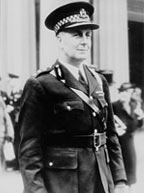Percy Sillitoe
( policeman, spook) | ||||||||||||||||||
|---|---|---|---|---|---|---|---|---|---|---|---|---|---|---|---|---|---|---|
 | ||||||||||||||||||
| Born | Percy Joseph Sillitoe 22 May 1888 Tulse Hill, London, United Kingdom | |||||||||||||||||
| Died | 1962-04-05 (Age 73) Eastbourne, East Sussex, United Kingdom | |||||||||||||||||
| Nationality | British | |||||||||||||||||
| Founder of | International Diamond Security Organisation | |||||||||||||||||
| ||||||||||||||||||
Percy Sillitoe was a former policeman who had headed a number of constabularies before taking over MI5.[1]
Background
Percy Sillitoe had a remarkable singing voice that earned him a free place at the prestigious St Paul's Cathedral Choir School, giving him not only an education but a chance to sing at the memorial service for Queen Victoria and the coronation of Edward VII.
South Africa
He travelled to South Africa and started working for the Anglo American Oil Company in 1905. It quickly bored him, and in 1908 he joined the British South African Police as a trooper. After his death, it emerged that he had fathered a child with Mary Museba, then only 13. In 1920, Sillitoe married Dorothy and they went on to have a son and daughter. After a serious illness, he returned to UK "with a plan to become a chief constable".[2]
UK Police
Back in UK Sillitoe studied law at Gray's Inn but hated it. At last, in 1923, he became Chief Constable of Chesterfield. Some reports suggest he became a freemason while in this job.[3] After two years at Chesterfield, and one at East Riding of Yorkshire, he became Chief Constable of Sheffield.
During his time as Chief Constable of Glasgow, he was credited with the introduction of wireless radios allowing communication between headquarters and vehicles, which previously relied completely upon the use of Police boxes, use of civilians in police related roles, and the introduction of compulsory retirement after 30 years service. He is credited with breaking the power of the notorious Glasgow razor gangs during the 1930s. He was Chief Constable from 1931–42. He introduced the Sillitoe Tartan (the black and white check pattern that now appears on police caps across Europe) to help visibility during unrest. Sillitoe was very successful in eliminating street gangs from Scotland, and earned the nickname "Hammer of the Gangs". In 1942, he was knighted and when he left Glasgow in 1942 he was the most famous cop of his time.[2] After World War II he was Chief Constable of Kent.
MI5
Sir Percy Sillitoe was an outsider brought in to MI5 as an "honest copper" to regularise the service, replacing David Petrie as Director General in May 1946.[4] Until Sillitoe's leadership, "the organisation was totally independent. Its staff was paid in cash, and paid no tax, and salaries could be at the whim of the director general. There was an independent auditor to ensure against embezzlement, but no detailed returns were made to the government and recently retired officers can remember how the directors general of both MI5 and the secret service had hoards of gold sovereigns, which the could hand out for special operations. That situation ended when Sillitoe demanded that MI5 be expanded. The Treasury agreed but only on condition that it could impose controls."[5]
His reputation was damaged by the 1951 defection to the Soviet Union of the spies Guy Burgess and Donald Duart Maclean, and by the investigation afterwards, which showed that MI5 had been unaware and slow to act. He resigned in November 1953.[6]
Writings
He was the first head of the Security Service to publish an autobiography, Cloak without Dagger which came out in 1955, after a lot of censorship by MI5.[7][2]
Later activities
After retirement, De Beers hired Sir Percy Sillitoe to set up the International Diamond Security Organisation (IDSO) in order to tackle diamond smuggling, using ambushes, death squads and torture. Sillitoe's IDSO commissioned a private army to penetrate and topple the “million-carat network”―the world’s most notorious diamond smuggling ring. When IDSO's operation was complete, the Sunday Times gave the story to Ian Fleming, who had impressed Sillitoe with his earlier Bond adventure "Diamonds Are Forever". Fleming was contacted by an IDSO agent, John Collard, whom he met in Morocco. The result of their conversations was a series of newspaper articles about the "million carat network", a book, "The Diamond Smugglers", and the James Bond novel "Diamonds are Forever" (1956).[8]
Sillitoe was later sacked by De Beers and returned to England where he chaired a company called Security Express.[2]
References
- ↑ Former Directors General, MI5, accessed 8 July 2009.
- ↑ Jump up to: a b c d http://www.dailyrecord.co.uk/news/uk-world-news/feared-glasgow-cop-beat-gangs-1004061
- ↑ http://web.onetel.com/~peck2000/lutudarumlodge/history.htm
- ↑ http://cosmos.ucc.ie/cs1064/jabowen/IPSC/php/authors.php?auid=64273
- ↑ Their Trade is Treachery: The full, unexpurgated truth about the Russian Penetration of the World's Secret Defences, by Harry Champan Pincher
- ↑ Anthony Blunt: His Lives, by Miranda Carter, 2001.
- ↑ Former Directors General, MI5, accessed 8 July 2009.
- ↑ "The Diamond Smugglers: The True Story of an International Crime Ring and Its Downfall, Told by the Creator of James Bond"